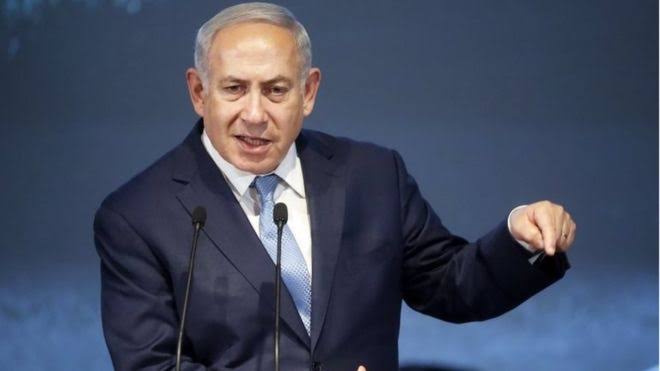Israel’s Benjamin Netanyahu on Thursday became the country’s first prime minister to be indicted in office, on corruption charges, but defiantly condemned the “coup” against him and vowed to hold onto power.
The shock announcement compounded the political chaos gripping Israel, which has been without a government for months and faces the prospect of its third election in a year.
After months of suspense, Israel’s longest-serving premier was charged by Attorney General Avichai Mandelblit with bribery, fraud and breach of trust.
Netanyahu immediately hit back in an often vitriolic 15-minute speech, accusing the judiciary, police and others of plotting against him with “false” and “politically motivated” allegations.
“What is going on here is an attempt to stage a coup against the prime minister,” he charged in a televised address.
“The object of the investigations was to oust the right from government.”
He vowed to stay on as interim premier despite potential court dates and intense political pressure.
“I will continue to lead this country, according to the letter of the law,” he said.
Political rival Benny Gantz, who had been trying to form a coalition government, said it was a “very sad” day for Israel to indict a leader, but called on Netanyahu to “step down from his position and focus on the charges against him”.
“There is no coup in Israel, but rather those that have barricaded themselves in power,” he said.
‘Hard and sad day’
The 70-year-old premier, nicknamed “Mr Security” and “King Bibi”, has been in power since 2009 and dominates Israel’s political scene.
The indictment comes with crunch talks due on forming a government, after two inconclusive general elections left the country’s political system deadlocked.
Netanyahu is not legally required to resign unless he is convicted and any subsequent appeals process is exhausted, but political pressure is likely to be intense.
He may now ask the parliament, or Knesset, to grant him immunity from prosecution.
The charges against Netanyahu range from receiving gifts worth thousands of dollars to a deal to change regulatory frameworks in favour of a media group in exchange for positive coverage.
Mandelblit said it was a “hard and sad day” for Israel to indict a leader, but it showed no citizen was above the law.
“The citizens of Israel, all of us, and myself, look up to the elected officials, and first and foremost to the prime minister,” Mandelblit said.
“Law enforcement is not a choice. It is not a matter of right or left. It’s not a matter of politics.”
On a day of high political drama, dozens of Netanyahu supporters gathered outside his official residence, many holding pictures of the PM and slogans attacking Mandelblit.
“We are all Netanyahu,” one sign read.
But on Twitter, many hailed the day’s events, and “happy day” quickly became Israel’s top trending phrase.
‘Fight for political life’
A perennial fighter, Netanyahu has outlived many political rivals. Hugh Lovatt, Israel-Palestine analyst at the European Council on Foreign Relations, said he wouldn’t give up power easily.
“Now more than ever Netanyahu will be fighting for his political and personal life,” Lovatt said.
Of the three cases against Netanyahu, the third, known as Case 4,000, is seen as the most serious and carries bribery, fraud and breach of trust charges.
He is alleged to have negotiated with Shaul Elovitch, the controlling shareholder of Israeli telecommunications giant Bezeq, to secure positive coverage on his Walla! news site in exchange for policies benefiting Bezeq.
Elovitch and his wife were also indicted.
Case 1,000 involves allegations Netanyahu and his family received gifts including luxury cigars, champagne and jewellery from wealthy individuals, estimated to be worth more than 700,000 shekels ($200,000, 185,000 euros), in exchange for financial or personal favours.
Another, Case 2,000, concerns allegations Netanyahu sought a deal with the owner of the Yediot Aharonot newspaper that would have seen it give him more favourable coverage.
Political turmoil
The next steps in the process remain unclear, with no trial date yet set.
The developments were set to only deepen the political turmoil in Israel, which has been without a stable majority government for much of the year.
Neither Likud leader Netanyahu nor rival Gantz, head of the centrist Blue and White party, have been able to form a coalition government following deadlocked elections in April and September.
Netanyahu has remained interim prime minister.
The Knesset has 21 days remaining to find a candidate capable of commanding the support of the majority of the country’s 120 MPs, and the indictment is likely to strengthen former army chief Gantz’s claims.
Gantz has reportedly tried to woo Likud MPs to join him in a broad national unity government, but so far there have been no takers.AFP
![]()
























